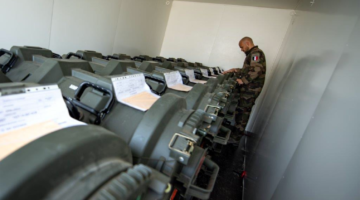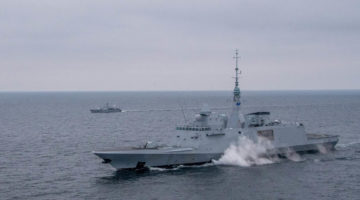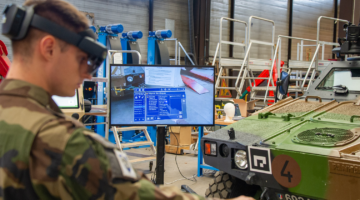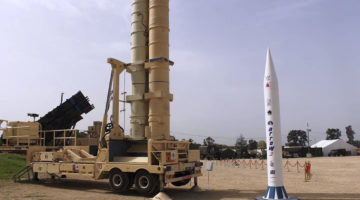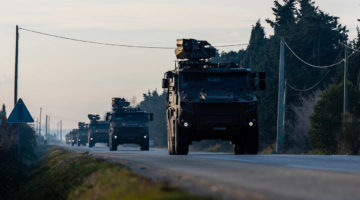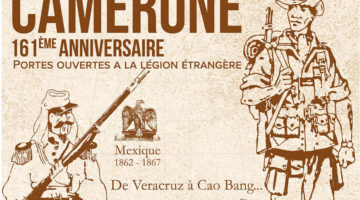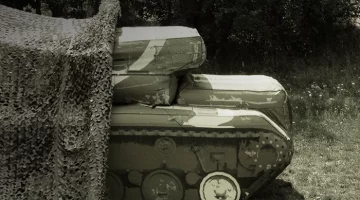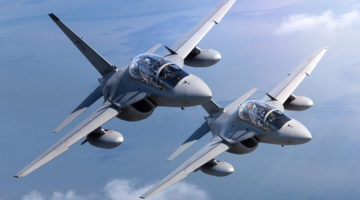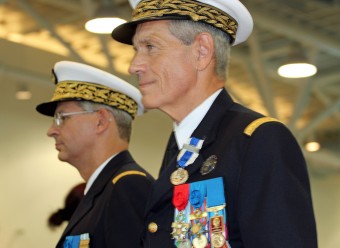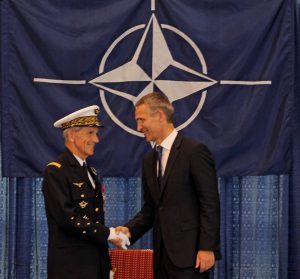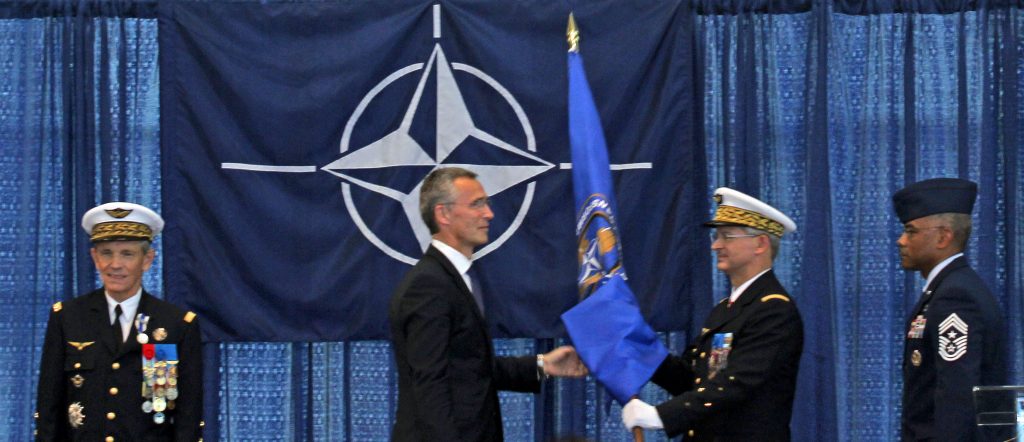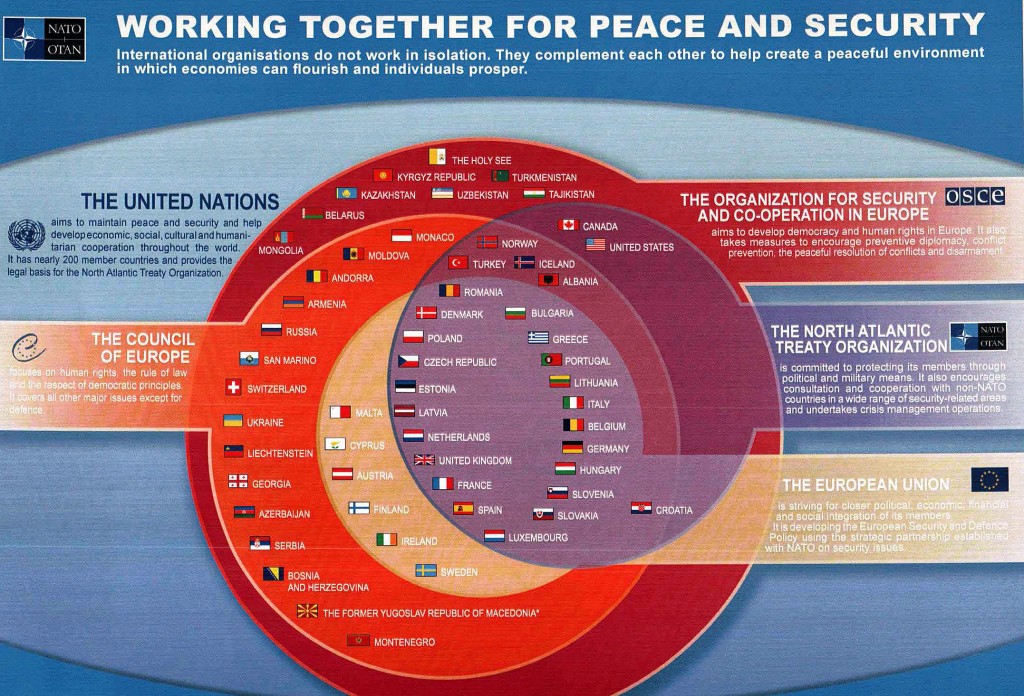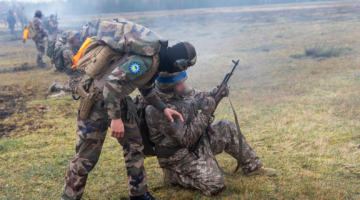On September 30th, 2015, a change of command ceremony took place in Norfolk, Virginia, during which NATO Secretary General Jens Stoltenberg presided over the official handover of the post of Supreme Allied Commander Transformation (SACT) from General Jean-Paul Paloméros to General Denis Mercier and awarded the former with NATO Meritorious Medal.
“It is in the compelling zest of high adventure and of victory,
and in creative action, that man finds his supreme joys.”
(Saint Exupery)
Abstract from Secretary General Jens Stoltenberg’s Speech
(…) General, yours has been a long and distinguished career.
Your bravery under fire was exceptional.
Your reputation as a leader – both within the French Air Force, and within NATO – is exemplary.
It was NATO’s privilege that you were appointed as Supreme Allied Commander Transformation.
And thanks to your leadership, the Alliance is now in a better position to face the future.
Jean-Paul, here at Norfolk, as at every stage of your career, you have embodied the fine traditions of the French Air Force.
You have acted with dedication, determination and the utmost professionalism.
I will leave you with the words of one of your most treasured authors, Antoine de Saint-Exupéry:
“It is in the compelling zest of high adventure and of victory, and in creative action, that man finds his supreme joys.”
On behalf of all Allies and all NATO staffs, I would like to thank you for your outstanding contribution to our Alliance.
And it is now my honour to present you with the NATO Meritorious Service Medal.
Two former French Mirage pilots with some 3,000 + flight hours, two former Chief of Staff of the French Air Force, both General Paloméros and General Mercier share the same vision about their role as SACT based on the deeply-anchored belief about the crucial role played by NATO in keeping peace and stability in Europe since the end of World War II, the need to preserve and enhance the ability to work together as an alliance, and the willingness to tackle current innovative thinking to face short and long-term threats and challenges.
In his very first public statement to the media a few minutes after he officially became SACT, General Mercier stressed that conviction as he reminisced his career in his introductory remarks:
« If I recall my career, there are two points I would like to highlight:
- First, when I was a young officer, a young pilot, I had the opportunity to participate in many exercises during the Cold War, as well as various NATO operations. The lesson I learned from this time is the certainty that NATO has provided us with all the tools for interoperability, training, concepts, doctrine and the capability to work together as an Alliance. I have always kept that in mind… NATO is an organization that in its 66 years of excellence have very much contributed to peace and security in Europe: our challenge is to continue to do that.
- During the second part of my career in France, I was involved with transformation : because we face an unpredictable and uncertain world in which we continue to face surprises, we have to continue our transformation. We have to continuously transform ourselves, not for the sake of transformation. We have to ask ourselves « transformation for what project? » in order to be sure that in the short term, and in the long term – which is ACT’s challenge –, we can foresee some of the security challenges and ensure that all countries and partners will be able to face any of them in the context of the Alliance strategic concept, which is three fold: collective defense, crisis management and cooperative security. (…)
I shall follow what my predecessor has done and there will be no interruption. »
A Very Different Kind of Environment
The first Russian strikes in Syria that very morning of SACT Change of Command symbolized however how much has changed over the past three years, when General Paloméros was being the one assuming command from General Abrial. As General Paloméros wrote in the introduction of ACT’s Special Edition publication « Transformation: Enabling the Future »:
« Three years ago, when I took over the post, NATO was preparing to disengage its forces from Afghanistan. Some observers were already questioning the Alliance’s raison d’être, hastily overlooking the essential role this unique political and military organization have played in maintaining peace and stability in Europe over the last 60 years.
Aware of the economic, financial and capability, challenges facing every one of the 28 Nations of the Alliance, I set five main lines of effort for my Command:
- Strengthen our strategic foresight efforts ;
- Refocus operational training on high-intensity conflicts, while preserving the lessons learned from two decades of operations ;
- Rationalize and optimize the Alliance’s current and future capabilities ;
- Work with our Partners more closely and more actively, in particular the European Union (EU) with which NATO shares 22 member states ;
- And finally seek an ever stronger Transatlantic Link, which is at the heart of the Alliance. »
In the press conference he gave right before the Change of Command ceremony, Secretary General Stoltenberg did give high marks to the Norfolk-based NATO Allied Transformation Command for providing the advice on which « NATO is based »:
« NATO is based on advice done in Norfolk (…) adapting and transforming into an agile forward-leaning alliance », he said, also pointing out at the exercises being organized by ACT. In the past two years, the number of major exercises indeed went from one to six leading towards Trident Juncture 2015, which is to be the highest level NATO exercise since 1998 in terms of size and scope. But even exercises are not static and must reflect the real world and incoming real life threats. That is why, as explained General Mercier, TJ15’s scenarios have been adjusted in order to take into account among other things hybrid warfare (« we have to prepare the Alliance for any kinds of crisis in the future »), cyber events (« we have to increasingly work on connectivity in the future and cyber is a big part of it. Cyber concerns everything (…) and could lead to other domains of warfare, i.e. resilience. What we do in that domain applies to other areas as well. »), and communication (« we have to continue to work on STRATCOM: how can we better use our means of communication to counter the threats to our communication channels? This is a key question for us and it will be for Trident Juncture’s participants. »).
As NATO was disengaging from Afghanistan, General Paloméros led the Alliance’s transformation with the constant preoccupation to preserve a decade of learning to work together as a coalition in such complex theaters. This is paying off in the current environment, as pointed out by Secretary General Stoltenberg who stressed last Wednesday that, although the effort against ISIL is not NATO-led, « all NATO allies are participating » one way or another, while « the skills used in the US-led coalition to fight ISIL » came from the Afghan experience.
Intertwined Threats To Face
The Crimea crisis froze the NATO-Russian Partnership For Peace and all follow on cooperation which had been enhanced under the NRC (NATO Russian Council) established in 2002. The new twist on Syria illustrates the complicated cluster between traditional Cold War practices and the new XXIst Century battlefield and has all the ingredients of the “perfect storm” : disinformation in the internet/social media era is a game the Russians are very good at and NATO has to find ways to counter it the best way possible. The current debate about who the Russians hit in Syria and their lack of effort to deconflict their airstrikes with ongoing coalition activities is very typical of more to come. Jens Stoltenberg, when asked a question about « counter-propaganda » had a very brave and noble answer: « we shall never counter propaganda with counter-propaganda, but with the Truth ». But the challenge is enormous, especially as other NATO adversaries, such as terrorist organizations, play that game of disinformation rather well too.
Countering turmoil and terrorism on the Southern flank of NATO follows the same logic of working with regional partners (« we work with Afghanistan and Iraq, but also countries such as Jordan and Tunisia », he said) and assisting them to take responsibility for their security and stabilize the region The General Secretary acknowledged that, as far as Afghanistan was concerned and in light of the recent Kunduz situation, « we never thought it would be easy ». He did however demonstrated hope in the courage and motivation shown by the Afghan troops over the last months, while on the Ukrainian front, he highlighted the fact that for the first-time the current ceasefire seems to be holding with an agreement to remove heavy weaponry.
Easy, it will not be for the new SACT as he pursues NATO’s Transformation among 28 members. For General Mercier, one of the key is to keep enhancing the links between the European Union and NATO and avoid duplication. Past commitments to rebalance the burdensharing between the United States – who supports 70% of the cost – seem to slowly alleviate what was a major concern three years ago following the three-step process described by the Secretary General : « 1) stop the budget cuts ; 2) increase the budgets ; 3) reach the 2% of GDP goal within a decade ».
Credit: SACT
General Mercier just ended a major transformation of the French Air Force (FAF) as Chief of Staff based on a strategic plan, which one could translate in English by the famous saying « United We Stand ». He sees some similarities with the mission awaiting him:
« What is more complicated in my job today is that we have to deal with 28 nations to pursue transformation, but some of the key points I had in mind for the FAF will still be relevant. If we want to continue to prepare our Alliance to operate in future challenges, I have identified five areas of priority:
- The first is Command and Control and ISR (Intelligence, surveillance and reconnaissance): C4ISR is crucial for the future; it has always been the main strength of NATO, which has been able to face the challenges of a very changing world, precisely because it relies on a strong C2 structure. But, as we deal with this aspect, we have to keep in mind the fact that more and more nations will be connected, not only among themselves, but to a robust C4ISR. We have to work on that step by step;
- the second is logistics, which is essential to our current capabilities;
- the third is training, all the more important when you work with 28 nations;
- then there is manpower: how do we get from all these countries the appropriate people with the right skills and readiness to act together;
- and, fifth, the development of capacities.
This is pretty much what I did in the FAF. I intend to use the same recipe at NATO, which could be more complicated, but an exciting challenge… »
Indeed, in light of the current international developments, General Mercier’s main challenge might be to protect the Alliance from renewed forms of Cold War-type decoupling strategies coming « tous azimuts », since, as we all know, « United We Stand, Divided We Fall »….
Photos©Murielle Delaporte
See Secretary General Jens Stoltenberg’s full press conference >>>
Credit: NATO, 2015
See also >>>
On SACT Change of Command >>
http://www.air-cosmos.com/le-general-mercier-devient-commandant-supreme-de-l-otan-43872
Related Topics, see for instance >>>
On Syria and ISIL>>
http://www.politico.com/story/2015/09/hillary-clinton-syria-obama-214182
On Ukraine>>
On Afghanistan>>

